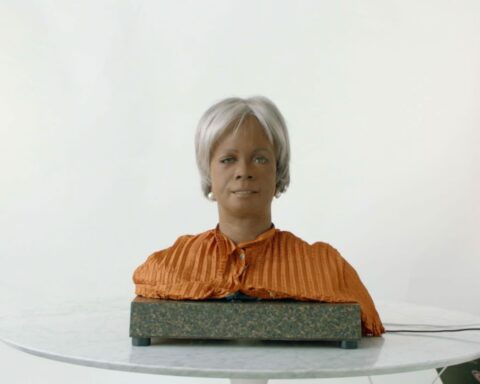The Truth About Killer Robots
(USA, 83 min.)
Dir. Maxin Pozdorovkin
Programme: TIFF Docs (World Premiere)
The Truth About Killer Robots focuses on the insidious nature of robots. Creeping into our lives with humans too dazzled by convenience and the spectacle of technology to notice the downfalls of anything from faster manual labour to self-driving cars, robots can, and have, resulted in the deaths of humans. Maxim Pozdorovkin’s latest film opens with just that: the death of a worker in a Volkswagen factory. But while the question of physical violence is present, Killer Robots is more intent on the question of the capitalist casualties. When jobs are automated and workers are displaced, where do they go?
Speaking to the wealthy, the mechanization of labour is a good thing. It means we have more time, we can relax, and we can enjoy life. But interviewing the workers whose jobs are in jeopardy, we see a different perspective. These people express fear of being replaced, or the wound of lost wages when hours are given instead to robots who never complain or tire. But in challenging the capitalist casualties of mechanization, Killer Robots never develops the issue itself. The film instead feels as though it fears technological advancement without the astute criticism of capitalism which it merely hints at. Articulating clearly the problem of robots in relation to class and labour, it never goes further to discuss the base of the issue: class and labour in relation to society.
But most jarring perhaps is the missing gendered angle. The documentary consistently features robots which are feminized. Anthropomorphic robotic hostesses or desk clerks take the form of young, thin, pretty, and complacent women ready to serve, while a man describes his marriage to an android (a large breasted waif, perpetually in high heels and lace garters, who, if you use the right keywords, will moan satisfactorily in sexual situations). The film itself is even narrated by a feminine robot. While Pozdorovkin is keen to investigate how robots impact human life, he never focuses in on how they relate to women specifically, despite how much he includes these gendered robots in his film. We may wonder how this might impact the objectification of women, or how it reflects international ideals of feminine servitude, but these questions, in an otherwise inquisitive documentary, are never raised. While Killer Robots broaches interesting subjects on how robots impact human life as well as human death, it remains too focused on its sci-fi beginning. It doesn’t delve deeply enough into the world in which mechanization takes place.
Overall the documentary is too slight. The narration, from a robot’s perspective, is cute, but not in a good way. Overly contrived and attempting to be “edgy,” it is, if anything, slightly tacky (especially when paired with constant robotic special effects, like face scanning filters every time a new interviewee shows up). Killer Robots is essentially a film of style over substance. It has a look, it has emotional overtones (mainly that of a fear of technology), but it never dives too deeply into its subjects. While the ideas it suggests are intriguing, it would have been more satisfying if they had been more thoroughly explored.
Visit the POV TIFF Hub for more coverage from this year’s festival!












